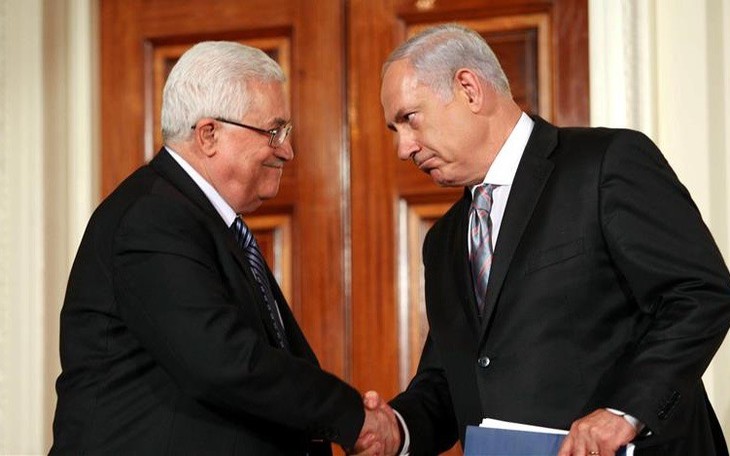(VOVWORLD) - In the Middle East, which has been a smoldering hot spot for decades, recent destabilizing developments are threatening to ignite a new major conflagration.
 Palestinian President Mahmoud Abbas and Israeli Prime Minister Benjamin Netanyahu (photo: Anadolu) Palestinian President Mahmoud Abbas and Israeli Prime Minister Benjamin Netanyahu (photo: Anadolu) |
Last week the Palestinian government, in response to Israel’s plan to annex certain areas of the West Bank, declared an end to all agreements signed with the US and Israel.
Palestine leader Mahmoud Abbas said on May 20th that Israel’s annexation plan shows it has no interest in complying with peace agreements. He said the state of Palestine is therefore absolved of all agreements and understandings with the US and Israeli governments and of all commitments based on those agreements and understandings, including all security agreements.
Analysts say the long-discussed two-state solution and the Middle East peace process appear to be all but dead now.
Middle East peace could be a fading dream
International sources report that at an emergency meeting in Ramallah City in the West Bank on May 19, President Abbas mentioned by name the Oslo Agreement of 1993, the Hebron Agreement of 1997, and the Wye River MoU of 1998. These agreements have protected Israelis while maintaining the Palestinian Authority’s political control of the West Bank of the Jordan River.
If Palestine ends all agreements and security cooperation with Israel, all progress toward Middle East peace will be erased. Analysts predict that another war could be the result. The Palestinian territory has been in a state of high tension for decades. Armed conflicts, big and small, have occurred regularly along the border between Israel and the West Bank and between Israel and the Gaza Strip. The most recent bloody clashes erupted in 2018 when the US officially recognized Jerusalem as the capital of Israel and moved the US embassy there. There is talk of a 3rd Palestinian Intifada rising up in the West Bank, similar to the one in September, 2000.
End of the road for the Palestinians
In recent years, the Palestine-Israel struggle has taken a back seat to the fight between Iran and Saudi Arabia. As Iran’s influence in the Middle East has grown, the US has strengthened its ties with Israel, as well as with Saudi Arabia and its allies. This has worked to the disadvantage of Palestine, and the Palestinians are well aware of it. There is no one to temper Israel’s ambitions as long has it has the US’s unequivocal support.
The dangerous move of ending all security arrangements with Israel is a desperate effort by the Palestinians to regain some international attention and, they hope, some international support.